Justin Taylor's Blog, page 189
September 28, 2012
Dramatized ESV New Testament Audio: Free at Amazon
I’m not sure how long this will last, but the MP3s for an entire set of the dramatized ESV New Testament, produced by the wonderful ministry of Faith Comes by Hearing, is currently available for free at Amazon. Running time is around 19 hours.
HT: Mark Ward
September 27, 2012
Desiring God Conference Live-streamed for Free: English and Spanish
From Desiring God:
If you’re not able to join us in Minneapolis for the conference this weekend, each of the main sessions will be live-streamed in both English and in Spanish at www.desiringgod.org/live.
The following is a schedule for the live-stream feed (all times Eastern). The live-stream feed will not include musical worship. Messages marked with an asterisk (*) are approximate start times only. The actual start times may vary based on the length of musical worship prior to teaching. Be sure to tune into the stream a few minutes earlier than scheduled for these sessions.
Friday, September 28
8:30* – 9:30 PM, John Piper, “Prelude to Acting the Miracle: Putting Sanctification in Its Place”
Saturday, September 29
10:00* – 11:00 AM, Kevin DeYoung, “Incentives for Acting the Miracle: Fear, Rewards, and the Multiplicity of Biblical Motivations”
11:30 AM – 12:30 PM, Ed Welch, “Sinners Learning to Act the Miracle: Restoring Broken People and the Limits of Life in the Body”
2:45 – 3:45 PM, Jarvis Williams, “Acting the Miracle in the Everyday: Word of God, Means of Grace, and the Practical Pursuit of Maturity”
4:15 – 5:15 PM, Panel Discussion, DeYoung, Moore, Piper, Welch, and Williams
8:30* – 9:30 PM, Russell Moore, “Acting the Miracle Together: Corporate Dynamics in Christian Sanctification”
Sunday, September 30
11:00* AM – 12:00 PM, John Piper, “Remember the Gospel, Act the Miracle: Future Grace, the Word of the Cross, and the Purifying Power of God’s Promises”
September 26, 2012
Vaughan Roberts on Same-Sex Attraction
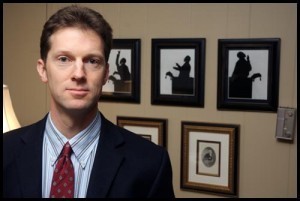 Vaughan Roberts, rector of St Ebbe’s, Oxford, and the author of God’s Big Picture: Tracing the Storyline of the Bible, recently gave an interview to Julian Hardyman (senior pastor of Eden Baptist, Cambridge) in Evangelicals Now on his struggle with same-sex attraction.
Vaughan Roberts, rector of St Ebbe’s, Oxford, and the author of God’s Big Picture: Tracing the Storyline of the Bible, recently gave an interview to Julian Hardyman (senior pastor of Eden Baptist, Cambridge) in Evangelicals Now on his struggle with same-sex attraction.
David Ould has highlighted some excerpts, which are reproduced below.
Does the disclosure that same sex attraction is one of your personal battles mean you are defining yourself as a homosexual?
No, it doesn’t. . . . All of us are sinners, and sexual sinners. But, if we have turned to Christ, we are new creations, redeemed from slavery to sin through our union with Christ in his death and raised with him by the Spirit to a new life of holiness, while we wait for a glorious future in his presence when he returns.
These awesome realities define me and direct me to the kind of life I should live. In acknowledging that I know something of all eight battles covered in my book, therefore, I’m not making a revelation about my fundamental identity, other than that, like all Christians, I am a sinner saved by grace, called to live in the brokenness of a fallen world until Christ returns and brings all our battles to an end.
…
How do you think churches communicate [a] negative message?
The problem is largely caused by the fact that most of our comments on homosexuality are prompted, not primarily by a pastoral concern for struggling Christians, but by political debates in the world and the church. . . .
Also, in countering the simplistic binary model of the world that people are either born gay or straight (or, occasionally, bi), we are prone to make overly dogmatic comments ourselves about causation and cure. These can be heard to imply that homosexual attraction is just a matter of personal choice. This only increases the sense of shame already felt by those who experience unwanted same-sex attraction and can leave them with the impression that this is a battle that is not safe to share with others in the church. I have become convinced, therefore, that we need not only a greater openness in discussing issues of sexuality, but also a more positive vision and presentation of the nature of faithful discipleship for those who struggle in this area.
. . .
And is change possible? Can these attractions be redirected or altered?
The development of sexuality is complex and is, I think, best understood as being on a spectrum, along which individuals can move, especially in the years soon after puberty, but also later. A small proportion of people, including Christians, find that they remain exclusively attracted to the same sex as they grow into mature adulthood. God has the power to change their orientation, but he hasn’t promised to and that has not been my experience.
Research suggests that complete change from exclusively homosexual desires to exclusively heterosexual ones is very rare.
While supporting the right of anyone to seek help to change if they wish, our emphasis needs to be on encouragement to be godly and content in current circumstances.
September 25, 2012
What If “No Creed but the Bible” Is Unbiblical?
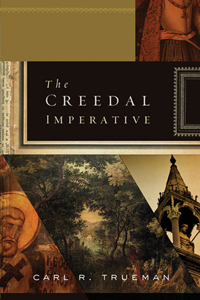 In his new book The Creedal Imperative Carl Trueman writes:
In his new book The Creedal Imperative Carl Trueman writes:
Christians are not divided between those who have creeds and confessions and those who do not; rather, they are divided between those who have public creeds and confessions which are written down and exist as public documents, subject to public scrutiny, evaluation, and critique; and those who have private creeds and confessions which are often improvised, unwritten, and thus not open to public scrutiny, not susceptible to evaluation and, crucially and ironically, not subject to testing by scripture to see whether they are true or not.
He concludes his first chapter—which you can read online—with a gentle challenge and encouragement to anti-confessional evangelicals:
I conclude this chapter by posing a challenge to those who, in their earnest desire to be faithful to Scripture as the supreme authority of faith and life, claim that they have no creed but the Bible. Reflect critically on the cultural forces that are certainly consonant with holding such a position and ask yourself whether they have perhaps reinforced your antipathy to creeds and confessions in a way that is not directly related to the Bible’s own teaching at all. Then, setting aside for just a moment your sincere convictions on this matter, read the rest of this book and see whether creeds and confessions might not actually provide you with a better way of preserving precisely those aspects of biblical, Christian faith which are most valuable to you and which you passionately wish to communicate to your church.
Here are a couple of commendations of the book:
“If the title of this book sounds boring to you, then it probably means you need it! Doctrinal aversion, radical individualism, unexamined subjectivism—these are only a few of the problems afflicting the evangelical church. In The Creedal Imperative, Carl Trueman wisely applies his vast historical knowledge to offer a remedy for such deficiencies. This book is especially important for so many believers whose Christian life, like mine, grew out of the soil of vibrant experience with insufficient doctrinal moorings. And beyond merely correcting errors, the lessons here have great potential for protecting the church, reinvigorating our cherished beliefs, and fostering greater unity in our worship. I’m grateful for Carl, and I’m grateful he wrote this book.”
—C. J. Mahaney, Sovereign Grace Ministries
“It is commonplace among many church leaders to dispute the need for confessions of faith on the grounds of the supreme authority of the Bible. In this timely book, Trueman demonstrates effectively how such claims are untenable. We all have creeds—the Bible itself requires them—but some are unwritten, not open to public accountability, and the consequences can be damaging. Trueman’s case deserves the widest possible hearing.”
—Robert Letham, Director of Research and Senior Lecturer in Systematic and Historical Theology, Wales Evangelical School of Theology; author, The Holy Trinity and Union with Christ
September 24, 2012
The Brain Is More Like a Muscle Than a Shoebox (or Why It’s Good for Kids to Learn Latin)
“If a football coach were making his player run wind sprints in a particularly hard practice, no one would upbraid him for making his players run from the thirty-yard line to the forty-yard line and then, mindlessly, pointlessly, back again. If he were confronted, he would point out that the issue was discipline and not the particular piece of ground the players were covering. In fact the ground covered in the subsequent game is not important in itself either but is related to a higher end.
“We tend to think of our students’ minds as finite shoeboxes, and we then think we must take special care not to put anything in there if we do not want it to remain there for life. But the brain is more like a muscle. A student who learns one language, such as Latin, is not stuck with his shoebox three-quarters full, with no room for Spanish. Rather the student has a mind that has been stretched and exercised in such a way that subsequent learning is much easier, not much harder.
“Now of course this kind of mental discipline could be acquired by requiring of the students the intellectual equivalent of running back and forth. While a football coach might be able to get away with this, because everyone understands the point, we should not attempt it in the classroom—although mental wind sprints that had no point in themselves would still be better than simple laziness. The reason this approach would not work in the classroom is that the human mind is inescapably teleological; it wants to know why it is learning something. Latin has the advantage of providing the grist for the mill of the mind, while also providing great practical advantages. To return to our metaphor of football, the study of Latin is therefore simultaneously an exercise to prepare for the game and part of the game.”
—Douglas Wilson, The Case for Classical Christian Education (Wheaton, IL: Crossway, 2003), 140-141.
The Relationship between Luther’s Theology and His Pastoral Practice
Carl Trueman, whose new book The Creedal Imperative will be published this month (and you can preview here), recently delivered the Gheens Lectures at Southern Seminary (September 11-12, 2012). You can find the video here, with audio soon to follow.
Below is a description of the lectures, followed by the videos.
“We Are Beggars: Martin Luther as Theological Pastor”
Lecture 1: Theological and Biographical Foundations. Trueman looks at Luther’s life and how it shaped his theology, particularly his understanding of the cross.
Lecture 2: The Word in Action. Trueman starts by reflecting on the late medieval philosophies of language which dovetailed with Luther’s understanding of the Bible’s own teaching. This then provides the context for understanding why preaching was so central to Luther’s pastoral practice and also why he held such a high view of the sacraments.
Lecture 3: The Tools of the Trade. Trueman shows how Luther’s theology actually worked out in practice in terms of his liturgical and catechetical compositions. He also reflects on how some debates within the Lutheran leadership help to shed light on his understanding of the role of confession and repentance in the Christian life.
Giving Historical Biographies to the Church
Here is a suggestion for pastors (though of course it is not limited to them). Consider studying a figure from church history—you could do one a year—and then give your congregation a gift of teaching them about this person. It will allow you to go deep into the life of an influential and flawed person, both encouraging you and instructed you by means of their faith and foibles.
Two men come to mind who model well this work of instructive, edifying biography for the church: John Piper and Michael Haykin. Piper, of course, is a pastor. Haykin is a professor and a historian. Their styles are different—Piper tends to do more analysis and application, while Haykin tends to provide more historical context—but both know how to tell these stories well.
Several of Piper’s biographical addresses—delivered each year at the Desiring God pastors’ conference—have been collected into an ongoing series published by Crossway, entitled The Swans Are Not Silent. Below I’ve listed the book, followed by links to the original talks (in manuscript and audio form, and more recently some in video).
After the Piper listing, I’ve included a number of talks delivered by Haykin. You’ll see that some of them overlap with each other, but I thought it helpful to include as many as I could find.
I have found listening to these to be a very edifying and encouraging experience. Perhaps some of you will be inspired to do the same for those in your spheres of influence.
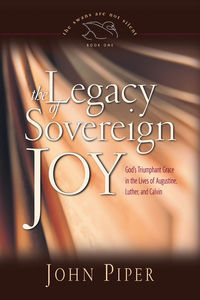 The Legacy of Sovereign Joy: God’s Triumphant Joy in the Lives of Augustine, Luther, and Calvin
The Legacy of Sovereign Joy: God’s Triumphant Joy in the Lives of Augustine, Luther, and Calvin
“The Swan Is Not Silent: Sovereign Joy in the Life and Thought of St. Augustine” (1998)
“Martin Luther: Lessons from His Life and Labors” (1996)
“The Divine Majesty of the Word: John Calvin: The Man and His Preaching” (1997)
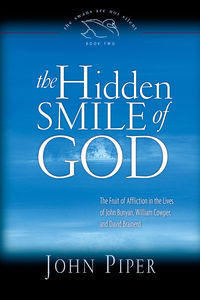 The Hidden Smile of God: The Fruit of Affliction in the Lives of John Bunyan, William Cowper, and David Brainerd
The Hidden Smile of God: The Fruit of Affliction in the Lives of John Bunyan, William Cowper, and David Brainerd
“To Live Upon God that Is Invisible: Suffering and Service in the Life of John Bunyan” (1999)
“Insanity and Spiritual Songs in the Soul of a Saint: Reflections on the Life of William Cowper” (1992)
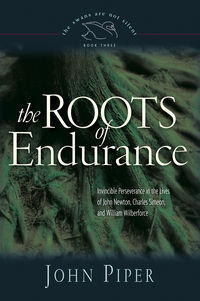 The Roots of Endurance: Invincible Perseverance in the Lives of John Newton, Charles Simeon, and William Wilberforce
The Roots of Endurance: Invincible Perseverance in the Lives of John Newton, Charles Simeon, and William Wilberforce
“John Newton: The Tough Roots of His Habitual Tenderness” (2001)
“Brothers, We Must Not Mind a Little Suffering: Meditations on the Life of Charles Simeon” (1989)
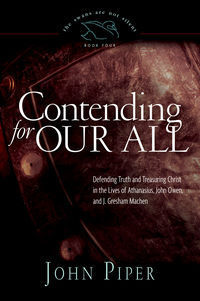 Contending for Our All: Defending Truth and and Treasuring Christ in the Lives of Athanasius, John Owen, and J. Gresham Machen
Contending for Our All: Defending Truth and and Treasuring Christ in the Lives of Athanasius, John Owen, and J. Gresham Machen
“Contending for Our All: The Life and Ministry of Athanasius” (2005)
“J. Gresham Machen’s Response to Modernism” (1993)
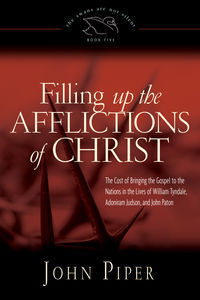 Filling Up the Afflictions of Christ: The Cost of Bringing the Gospel to the Nations in the Lives of William Tyndale, Adoniram Judson, John Paton
Filling Up the Afflictions of Christ: The Cost of Bringing the Gospel to the Nations in the Lives of William Tyndale, Adoniram Judson, John Paton
“Always Singing One Note—A Vernacular Bible: Why William Tyndale Lived and Died” (2006)
“You Will Be Eaten by Cannibals! Lessons from the Life of John G. Paton” (2000)
Other Piper biographical addresses not yet included in the published series are:
Jonathan Edwards (1988)
D. Martyn Lloyd-Jones (1991)
Charles Spurgeon (1995)
George Mueller (2004)
Andrew Fuller (2007)
William S. H. Piper (2008)
George Whitefield (2009)
C. S. Lewis (2010)
Robert Murray McCheyne (2011)
J. C. Ryle (2012)
Here are the talks by Haykin:
Roman Empire and Irenaeus of Lyons
Tertullian and Constantine
Athanasius and Basil
Leo and Patrick
Life of Tyndale
Cost of Living Dangerously, Tyndale and the Bible
Tyndale and the Gift of Your Bible
Life of Luther
Life of Calvin
Lady Jane Grey
Life of John Newton
John Newton, Life and Hymns
John Newton, Amazing Grace
William Wilberforce
Life of William Wilberforce
William Wilberforce, Truly Religious Man
William Cowper
Salina Hastings, Lady Huntington
Charles Wesley
Charles Wesley’s Hymnody
Charles Wesley, Life and Hymns
Charles and Sarah Wesley, Godly Marriage
Jonathan Edwards
Lessons from the Family Life of Jonathan Edwards
George Whitefield
Andrew Fuller
Life of Samuel Pearce
William Carey
Andrew Bonar
September 22, 2012
The Gospel of Jesus’ Wife: How a Fake Gospel-Fragment Was Composed
Francis Watson of the University of Durham has provided a six-page analysis (PDF) of the Coptic fragment which seems to say Jesus was married. This is the most in-depth examination I have seen yet. Professor Watson concludes that
The text has been constructed out of small pieces – words or phrases – culled mostly from the Coptic Gospel of Thomas (GTh), Sayings 101 and 114, and set in new contexts.
This is most probably the compositional procedure of a modern author who is not a native speaker of Coptic.
Among other scholars weighing in, see Gary Manning Jr., Darrell Bock, Christian Askeland, Michael Kruger, Peter Williams and Simon Gathercole, Dirk Jongkind, Daniel Wallace.
HT: Scot McKnight
September 21, 2012
Christian Faith and Learning: Is “Integration” the Best Metaphor?
Nicolas Wolterstorff:
We . . . have often used the language of “integration” to describe the project. . . . The project, we have said, is to integrate faith and learning. I have come to think that the metaphor of integration is a poor choice of metaphor. It suggests that the scholar is presented with two things, faith and learning; and that these two must somehow be tied together. The two-story metaphor has been discarded; no longer do we think in terms of placing faith on top of learning. Still, the assumption of duality remains. The idea now is that we tie them together somehow—find the right baling twine and the right place to attach it.
I submit that the project of Christian learning, rightly understood, rejects the assumption of duality that underlies the metaphor of integration. Here is an example of the point: the dominant ideology behind philosophy of art of the past two centuries is that art is an exception to the fallenness of our society; art has redemptive significance. How am I to integrate that ideology with my Christian faith? It can’t be done. I have to reject it, not integrate it; and having rejected it, I have to rethink philosophy of art and aesthetics so that it becomes faithful to my Christian conviction. What emerges, if I am successful, is not an integration of two separate things but just one thing: a philosophy of art faithful to Christian conviction. I have never found what seemed to me the absolutely right metaphor. However, better than the integration metaphor is the metaphor of seeing through the eyes of faith. When you look at something, you look at it with your eyes; you don’t look at it and then also at your eyes.
—Nicolas Wolterstorff, “Fifty Years Later,” Pro Rege 34, no. 1 (September 2005): 28.
HT: Keith Plummer
When Even Joel Osteen Is Treated as a Bigot
For those who regard homosexual behavior to be sinful, it’d be hard to imagine someone less offensive, definitive, and informed than Joel Osteen. He doesn’t preach about the holiness of God and he doesn’t preach about sin, much less the sin of homosexuality. To my knowledge, he never talks about it unless asked on a talk show. But that’s not good enough, as can be seen in his most recent interview on CNN:
This reminded me of a recent comment from Carl Trueman, in typical Trueman style:
You really do kid only yourselves if you think you can be an orthodox Christian and be at the same time cool enough and hip enough to cut it in the wider world. Frankly, in a couple of years it will not matter how much urban ink you sport, how much fair trade coffee you drink, how many craft brews you can name, how much urban gibberish you spout, how many art house movies you can find that redeemer figure in, and how much money you divert from gospel preaching to social justice: maintaining biblical sexual ethics will be the equivalent in our culture of being a white supremacist.
How then should we respond?
The answer to that takes much more than a blog post.
But here are a few points and resources that come to mind.
First, read Trevin Wax’s dialogue post, “How I Wish the Homosexuality Debate Would Go,” where Trevin explains how he wish Christians would respond on TV shows like this.
Second, remember the point that Greg Koukl makes here:
If you’re placed in a situation where you suspect your convictions will be labeled intolerant, bigoted, narrow-minded, and judgmental, turn the tables. When someone asks for your personal views about a moral issue, preface your remarks with a question.
You say: “You know, this is actually a very personal question you’re asking, and I’d be glad to answer. But before I do, I want to know if you consider yourself a tolerant person or an intolerant person. Is it safe to give my opinion, or are you going to judge me for my point of view? Do you respect diverse ideas, or do you condemn others for convictions that differ from yours?” Let them answer. If they say they’re tolerant (which they probably will), then when you give your point of view it’s going to be very difficult for them to call you intolerant or judgmental without looking guilty, too.
This response capitalizes on the fact that there’s no morally neutral ground. Everybody has a point of view they think is right and everybody judges at some point or another. The Christian gets pigeon-holed as the judgmental one, but everyone else is judging, too. It’s an inescapable consequence of believing in any kind of morality.
I highly recommend Koukl’s book, Tactics: A Game Plan for Discussing Your Christian Convictions. For a book-length analysis of The Intolerance of Tolerance, see Carson’s book by that title.
Third, we need to be informed about the larger presuppositions at play here regarding morality and the criteria of harm to society. Collin Hansen’s 15-minute conversation with Tim Keller and Al Mohler is a helpful introduction to thinking through some key ideas:
HT: Z
Justin Taylor's Blog
- Justin Taylor's profile
- 44 followers





